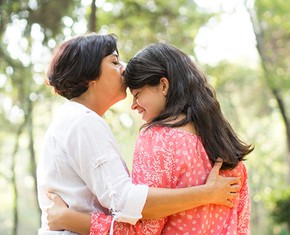The views expressed in our content reflect individual perspectives and do not represent the authoritative views of the Baha'i Faith.
Our media largely represents love as a magical, smooth-sailing phenomenon that somehow appears in the lives of conventionally attractive people.
Other times the media depicts love as full of pain, dishonesty, and miscommunication. I cannot count the number of times that I’ve watched a romantic comedy and angrily begged the characters to just simply tell the truth.
That being said, despite how cinematic depictions of love can feel overplayed or absurd, the messages the media feeds us are not always entirely untrue. Most of us know, or perhaps have been in, relationships that are chock full of lies, based only on sexual desire, or seemingly shallow in their nature.
Luckily, many of us looking for love can turn to our elders for advice, and reference lived experience to try and develop a more balanced and realistic idea of what it means to love someone. The anecdotal advice and wisdom people have collected is plentiful, and often helpful, but usually still limited.
Our experiences can easily be tainted. In love, some of us subconsciously mimic the adults we watched growing up; sometimes we try to compensate for personal insecurities through our relationships; and plenty of us adopt the ineffective communication styles common in our culture. As social creatures, it is no surprise that we can end up holding onto the wrong definitions of love. Finding well-rounded relationship goals can feel like a challenge.
In my own journey, recognizing that there are so many skewed expectations of what romantic love is, I have turned to the Baha’i writings as another source of guidance. They describe what true love—and a real, lasting marriage—can potentially be:
… marriage must be a union of the body and of the spirit as well, for here both husband and wife are aglow with the same wine, both are enamoured of the same matchless Face, both live and move through the same spirit, both are illumined by the same glory. This connection between them is a spiritual one, hence it is a bond that will abide forever. Likewise do they enjoy strong and lasting ties in the physical world as well, for if the marriage is based both on the spirit and the body, that union is a true one, hence it will endure. If, however, the bond is physical and nothing more, it is sure to be only temporary, and must inexorably end in separation.
When, therefore, the people of Baha undertake to marry, the union must be a true relationship, a spiritual coming together as well as a physical one, so that throughout every phase of life, and in all the worlds of God, their union will endure; for this real oneness is a gleaming out of the love of God. – Abdu’l-Baha, Selections from the Writings of Abdu’l-Baha, p. 117.
 Picking a partner and developing a relationship around the divinity within another person is clearly distinct from the common notion of choosing someone who you find small signs of compatibility with. Though physical attraction, habits around money, cleanliness, and communication are surely crucial to find coherence with in a functional relationship, this passage from the Baha’i writings implies so much more.
Picking a partner and developing a relationship around the divinity within another person is clearly distinct from the common notion of choosing someone who you find small signs of compatibility with. Though physical attraction, habits around money, cleanliness, and communication are surely crucial to find coherence with in a functional relationship, this passage from the Baha’i writings implies so much more.
Initially, this quote may sound pretty intimidating, but I have learned to view love as something more than finding someone to be comfortable with—it implies an expanded understanding of what there is to look forward to. It profoundly encourages me to try and maintain love with a person for the sake of the God I see reflected in them rather than just because I fear loneliness.
Though a much higher standard, it makes developing a long-lasting relationship feel much more achievable. We all change and grow, sometimes in unexpected ways, throughout our lives. Life throws tons of stuff our way, and as a natural response our individual selves change. This can obviously create strain, just as most of us have experienced with our friendships. It can feel like we “grow out of a person” or “grow apart” as other aspects of who we are ebb and flow with the movement of life.
But if we learn and choose to love for the sake of the deeper inner beauty we see within a person, and learn to express that love by trying to nourish its growth—even as the tests and difficulties of a relationship arise—those things are less likely to ruin the relationship.
Baha’is believe that everyone has the potential to reflect God’s light, but this is not to say that in choosing a life partner I can just choose any person. Instead, I try to aspire to this standard:
Baha’i marriage is union and cordial affection between the two parties. They must, however, exercise the utmost care and become acquainted with each other’s character. This eternal bond should be made secure by a firm covenant, and the intention should be to foster harmony, fellowship and unity and to attain everlasting life.
In a true Baha’i marriage the two parties must become fully united both spiritually and physically, so that they may attain eternal union throughout all the worlds of God, and improve the spiritual life of each other. – Abdu’l-Baha, Baha’i World Faith, p. 372
While requiring much diligence and reflection, an eternal union is definitely something worth working for.
















Comments
Sign in or create an account
Continue with Googleor